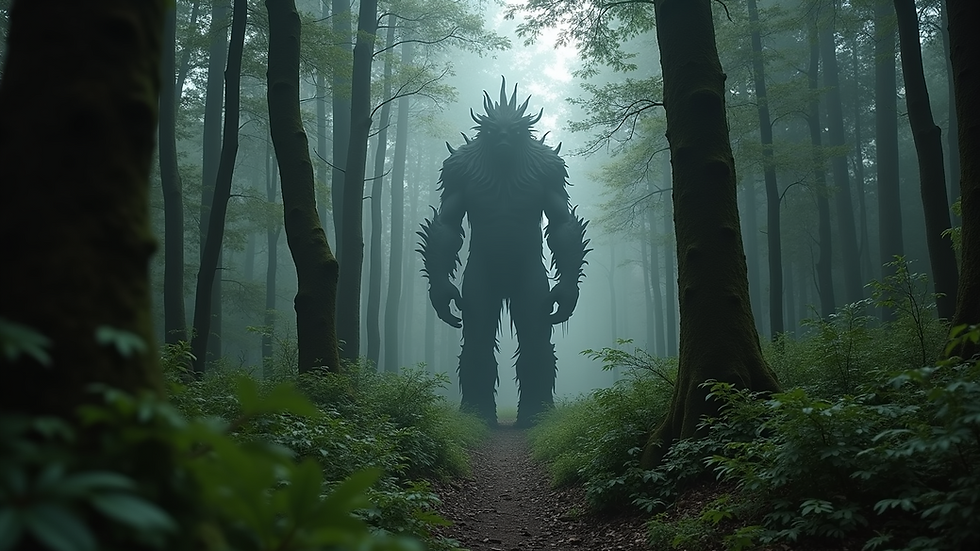Exploring the Genetic Inheritance of Nephilim Bloodlines and Their Intermingling with Humanity
- PsychicUnderLord (Psychic)

- May 14, 2025
- 4 min read
The legends of the Nephilim have fascinated people for centuries. Often depicted as giants or powerful beings, these enigmatic figures are believed to have emerged from the union of the "sons of God" and the "daughters of men." This intriguing idea of hybridization prompts us to consider genetic inheritance, the blending of human and divine traits, and how these bloodlines might influence contemporary humanity.
As we unravel the story of the Nephilim, we uncover a rich tapestry woven from mythology, religion, and science. We also begin to understand the potential impact of genetic inheritance on our society today.
The Origins of the Nephilim
In the Bible, the Nephilim are mentioned in the Book of Genesis. Genesis 6:1-4 notes their presence during a time when human populations were rapidly increasing. The references to "sons of God" and "daughters of men" have led to various interpretations, ranging from fallen angels to extraterrestrial beings.
The term "Nephilim" is often translated as "giants," which sparks curiosity about their physical attributes and abilities. Some scholars suggest that the Nephilim may symbolize extraordinary human traits—qualities that could resonate with certain individuals in our society today.
Genetic Mixing and Its Implications
The narrative of the Nephilim introduces a concept known as genetic mixing—where different species or subspecies come together to create offspring. In this case, it represents the blending of divine and human genetic traits, potentially resulting in extraordinary abilities.
Research shows that certain traits can skip generations. For instance, a child may display abilities or characteristics that are not apparent in their parents. Among the Nephilim, this could mean they represent individuals with extraordinary skills passed down from their mixed ancestry. Modern examples can be seen in sports; elite athletes often have family lineages that feature high levels of physical aptitude.
The Cultural Impact of Nephilim Bloodlines
Throughout history, stories about the Nephilim have surfaced in various cultures. From ancient texts to contemporary films, these legends reveal humanity’s fascination with power and the concept of the "other."
For example, in literature, characters like Goliath serve as reminders of the Nephilim's potential for both awe and fear. In modern media, superheroes often exhibit superhuman qualities, mirroring themes found in Nephilim tales. This reflects our collective desire to understand and confront the idea of greatness versus the societal outcast.

Tracing the Nephilim in Contemporary Ancestry
The blending of Nephilim bloodlines with humanity leads to fascinating questions about ancestry. Are there descendants of Nephilim hidden in contemporary society? Some claim that noble bloodlines, like those of kings or historic figures, trace back to Nephilim ancestry.
Recent advancements in genetic testing have enabled increased interest in ancestry, allowing individuals to explore their roots. It is estimated that over 26 million people have taken DNA tests from companies like AncestryDNA and 23andMe, opening possibilities for people to discover unique traits possibly connected to ancient beings.
The emphasis on genealogy in various cultures highlights our intrinsic drive to explore our heritage and the stories that might connect us to our ancient past.
Scientific Insights into Hybridization
Through the lens of science, hybridization is a significant concept in understanding the Nephilim narrative. Known as hybrid vigor or heterosis, this principle suggests that the offspring from distinct lineages may display enhanced traits, like increased resilience or improved health.
This idea implies that Nephilim offspring could possess remarkable qualities that are not present in humans alone. For example, hybrid plants have shown increased yields or disease resistance compared to their non-hybrid counterparts. Though we cannot definitively state that the Nephilim possessed supernatural powers, the natural world supports the idea that mixing genetic materials can produce unexpected strengths.
Ethical Dilemmas of Hybridization
The potential benefits of genetic mixing come with complex ethical concerns. Manipulating genetics to create desired traits raises crucial questions. What defines "value" in genetic material?
As we reflect on the Nephilim and their legacy, we see that the lines between human and divine qualities can be blurry. Exploring these boundaries may yield unintended consequences, much like the challenges depicted in Nephilim legends.
The Nephilim Legacy in Genetic Memory
The concept of genetic memory—suggesting that certain traits or experiences might reside within our DNA—parallels the Nephilim legacy. It raises the question of whether certain qualities from their lineage still resonate in the current human population.
The prevalent interest in genealogies across cultures emphasizes humanity’s desire to connect with our ancestors and their narratives. Discovering these connections can be a powerful motivator, allowing us to appreciate the rich histories that shape our identities today.
Final Thoughts
Exploring the genetic inheritance of Nephilim bloodlines and their intermingling with humanity presents a captivating journey through science, mythology, and culture.
As we navigate these stories, we learn that the essence of humanity is intricately defined by diversity. The Nephilim endure as a compelling metaphor for our search for identity, strength, and understanding in an ever-evolving world.
By examining these narratives, we not only engage with history but also gain valuable insights into our genealogical quests and the genetics that shape who we are. Whether regarded as mythical figures or historical possibilities, the story of the Nephilim continues to inspire lively discussions about identity, development, and the connections that unite us all.




Comments